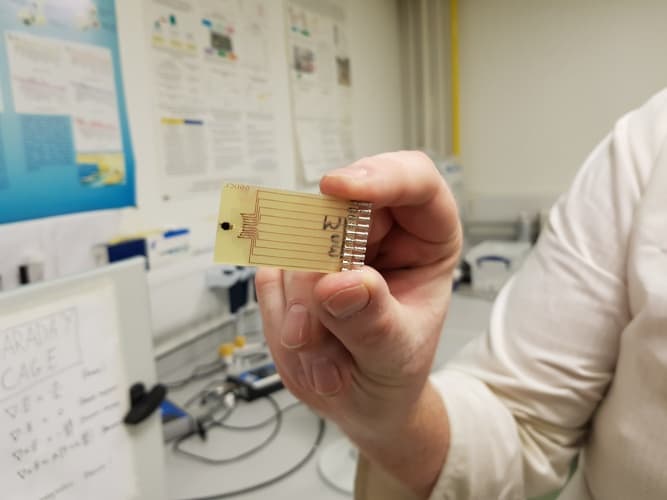
Developed by scientists at Strathclyde University, the device uses a microelectrode to detect interleukin-6 (IL-6) in patients’ blood. IL-6 is a protein biomarker that can indicate the presence of sepsis, which occurs when chemicals released by the immune system cause inflammation throughout the body.
The device takes a pinprick of blood which is then put on the chip for the result to be read. Its needle shape means it can also be implanted and used on patients in intensive care for constant monitoring. While current testing for the disease can take up to 72 hours, the new device can deliver a bedside diagnosis in around two and a half minutes.
“The research shows that the tools we’ve developed could underpin a rapid test for sepsis,” said Dr Damion Corrigan, from Strathclyde’s department of Biomedical Engineering. “We’ve developed a needle shaped sensor with different electrodes and have shown we can detect one sepsis biomarker in almost real time, at the clinically relevant levels.
“When levels go up, as they do in sepsis, we can detect that too. Sepsis is quite complex and difficult to diagnose but IL-6 is one of the best markers.”
According to the UK Sepsis Trust, around 52,000 people in the UK die every year and six million globally from the condition. However, early diagnosis and the correct treatment lead to most people making a full recovery. Current methods for detection rely on simple measurements such as body temperature, heart rate and breathing rate, with blood tests to confirm diagnosis requiring testing in a central laboratory that can take days. Reducing this time to minutes and providing near-instant diagnosis could not only save lives, it could also significantly diminish some of the associated effects that disease has on the body.
“With sepsis, the timing is key,” said Dr Corrigan. “For every hour that you delay the antibiotic treatment, the likelihood of death increases.
“It’s not just saving lives, a lot of people who survive sepsis suffer life changing effects, including limb loss, kidney failure and post-traumatic stress disorder. The test could stop a lot of suffering.”




Poll: Should the UK’s railways be renationalised?
Rail passenger numbers declined from 1.27 million in 1946 to 735,000 in 1994 a fall of 42% over 49 years. In 2019 the last pre-Covid year the number...